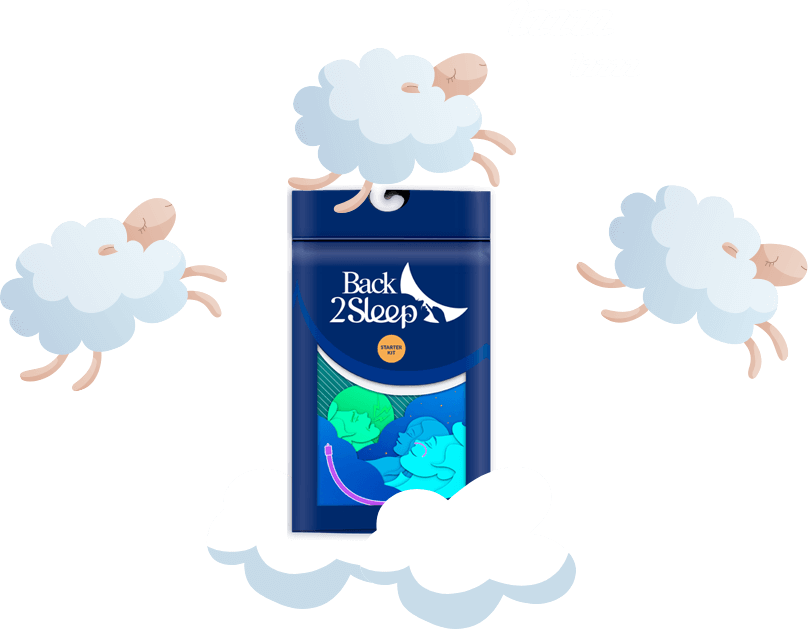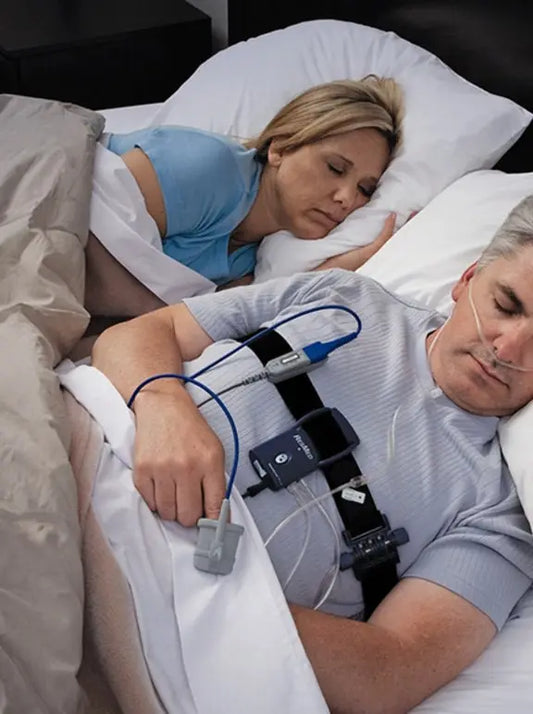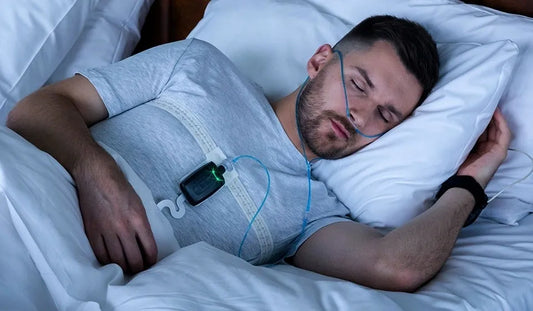Snoring isn't just a nighttime nuisance, it's your body's alarm call, signaling that something is blocking the passage of air optimally.
Imagine how much your quality of life, and that of your partner, would improve if you could stop snoring for good.
Snoring can be a symptom of a more serious problem, such as sleep apnea, which, if left untreated, can have serious health consequences.
Fortunately, solutions exist, ranging from lifestyle adjustments to more advanced medical interventions.
What is snoring?
Snoring, more than a simple night-time noise, can be a warning sign of more serious health problems.
Snoring occurs when the flow of air through the respiratory tract is partially obstructed during sleep.
This can be due to a variety of factors, including:
- relaxed throat tissue,
- a tongue falling backwards,
- or blocked nasal passages.
💊So why is snoring a problem?
Beyond interrupting sleep for the snorer and his or her loved ones, it may be indicative of more serious underlying conditions such as sleep apnea a disorder in which breathing stops temporarily during sleep.
This can increase the risk of cardiovascular problems, hypertension and even diabetes.
In addition, poor sleep quality due to snoring can lead to:
- daytime sleepiness,
- reduced concentration,
- and negatively affect overall quality of life.
💊What are the common causes of snoring?
The causes of snoring are varied and may include anatomical factors such as:
- deviated nasal septum,
- enlarged tonsils,
- or overweight, which increases pressure on the respiratory tract.
Lifestyle habits, such as drinking alcohol before bedtime or sleeping on your back, can also aggravate snoring.
Allergies or upper respiratory tract infections that lead to nasal congestion can also be culprits, as can relaxed throat and tongue muscles during sleep, especially in the elderly.
💊How does snoring affect your health?
This can have negative effects on your health.
Sleep disturbances caused by snoring can lead to fragmented sleep and non-restorative sleep, which can increase the risk of developing disorders such as:
- hypertension,
- sleep apnea,
- and even cardiovascular disease.
Chronic fatigue, lack of concentration and irritability are also common consequences, affecting your daily well-being and quality of life.
By understanding the causes and health impacts of snoring, it becomes crucial to seek solutions for peaceful, restful sleep.
How to identify a worrying snore?
Knowing when snoring becomes a warning signal is crucial to your health.
Asking yourself whether your snoring is just a minor annoyance or a sign of something more serious is an essential first step.
So how do you know?
First, listen to feedback from those who share your nocturnal environment: if someone tells you that your snoring is loud, constant and disturbing, that's a clue.
Then assess how you feel when you wake up: do you feel rested or exhausted? Morning headaches, a dry mouth or a sore throat can also indicate that your snoring hides deeper problems, such as sleep apnea.
If you wake up frequently during the night or suffer from daytime sleepiness, it could mean that your snoring is interfering with the quality of your sleep.
In these cases, consulting a specialist is not only a good idea, it's a necessity.
💊Tests and diagnostics to assess snoring
When snoring raises concerns, several tests and diagnoses can help to understand the causes and determine the best treatment.
An ENT examination will identify any structural abnormalities in the nasal passages or throat.
Specific tests, such as polysomnography (sleep study), can be performed to detect sleep apnea by measuring respiratory activity, oxygen levels in the blood, body movements, and sleep cycles during the night.
For less obvious cases, an audio recording of your sleep at home or a mobile sleep tracking app can provide further clues as to the severity and frequency of your snoring.
These assessments are essential to developing a personalized treatment plan, whether it involves lifestyle modifications, anti-snoring devices, or more advanced medical treatments.
Solutions to say goodbye to snoring
Discover tried-and-tested methods for restful nights.
For many, snoring is an unwelcome bedfellow.
Fortunately, solutions exist to reduce or eliminate this problem.
Lifestyle adjustments, such as:
- lose weight,
- avoid alcohol before going to bed,
- and sleep on your side,
- can have a significant impact.
For those looking for more concrete solutions, anti-snoring devices such as:
- intranasal orthoses,
- mandibular advancement orthoses,
- nasal strips,
- or special cushions are available.
In more severe cases, medical treatment, including surgery or the use of CPAP (continuous positive airway pressure), may be considered.
As each case is unique, a medical consultation is essential to select the most appropriate solution.
💊Lifestyle changes and home remedies
Fighting snoring often starts with simple changes in daily life.
📌 Losing weight can reduce pressure on the airways.
📌 Avoiding alcohol and sedatives before bedtime can prevent excessive relaxation of the throat muscles.
📌 Sleeping on your side rather than on your back can also help open up the airways.
📌 Home remedies such as room humidification can relieve nasal congestion and reduce snoring.
📌 Even exercises to strengthen the throat muscles can contribute to a quieter night.
💊Medical treatments and anti-snoring devices
For those whose snoring resists home remedies, a range of medical treatments and devices may offer a solution.
📌 Anti-snoring devices, such as:
- intranasal orthoses,
- mandibular orthoses,
- or CPAP, are designed to keep the airways open during sleep.
📌 Nasal strips and sprays can help clear nasal obstructions.
In some cases, surgery may be required to correct the anatomical abnormalities that contribute to snoring.
Whichever method you choose, the objective is clear: find the silence and tranquillity you need for a restful night's sleep.
Prevent snoring before it starts
Good sleep hygiene and a few adjustments can make all the difference.
Preventing snoring is simpler than it sounds and starts with healthy lifestyle habits.
Good sleep hygiene is crucial:
- establish a relaxing relaxing ritual before bedtime,
- maintain a regular sleep schedule and make sure your sleeping environment is conducive to rest.
The impact of diet on snoring
Certain foods and beverages, such as dairy products or alcoholic beverages, can aggravate snoring by promoting nasal congestion and relaxed throat muscles.
Conversely, a balanced diet rich in fruits, vegetables and whole grains can help reduce inflammation and maintain a healthy weight, thereby reducing the risk of snoring.
Drinking enough water throughout the day keeps throat tissues hydrated, preventing excessive slackening.
Incorporating anti-inflammatory foods such as ginger or pineapple can also be beneficial.
A healthy diet, combined with healthy sleep practices, can make a big difference for snorers and those around them.
💊Exercises to reduce snoring
Targeted exercises for:
- mouth,
- language,
- and throat can significantly reduce the frequency and intensity of snoring.
Daily practice of exercises such as pushing the tongue against the roof of the mouth and sliding it back, opening the mouth wide and contracting the throat muscles, or singing can strengthen the muscles of the airways, making them less likely to collapse during sleep.
These exercises, which take just a few minutes a day, can improve air circulation and reduce snoring, while improving sleep quality.
💊Recognizing when snoring is a warning sign
Although often considered a mere nuisance, snoring can sometimes signal underlying health problems, such as:
- sleep apnea,
- hypertension,
- or cardiovascular disorders.
If your snoring is particularly loud and accompanied by pauses in breathing, choking or sudden awakenings, it's time to consult a doctor.
Other warning signs include:
- excessive daytime sleepiness,
- morning headaches,
- or difficult concentration.
A medical assessment can determine the cause of snoring and suggest a suitable treatment plan, ensuring not only better nights' sleep but better overall health.
The Back2Sleep solution, the intranasal orthosis
The back2Sleep solution for those who want to stop snoring.
Designed to provide immediate, comfortable relief, this intranasal brace works by gently widening the nostrils, facilitating the passage of air. The result?
Significant reduction in snoring from first use
Not only does it improve sleep quality for the snorer, it also benefits his or her bed partner.
Easy to use and made from soft materials, the Back2Sleep orthosis adapts to all nostril shapes, guaranteeing a peaceful night's sleep without resorting to more invasive solutions.
Frequently asked questions about "how to stop snoring for good?"
💊Q. Can you really stop snoring?
No, there is no universal cure for snoring, as its causes vary greatly from one person to another.
Factors such as anatomical structure, weight, allergies and sleep habits play a crucial role in snoring.
This means that the solution that works for one person may not work for another. Identifying the underlying cause of snoring is essential to choosing the most appropriate treatment, whether it's lifestyle changes, anti-snoring devices, or medical treatments.
💊Q. Are home remedies effective against snoring?
Home remedies, although often underestimated, can be incredibly effective in reducing or even eliminating snoring for some people.
Adjustments such as changing sleeping position, maintaining a healthy weight, and reducing alcohol consumption before bedtime can have a significant impact.
In addition, studies and testimonials support the effectiveness of throat-strengthening exercises and the use of humidifiers to keep the respiratory tract moist.
However, their effectiveness will depend on the specific cause of the individual's snoring.

- Choosing a selection results in a full page refresh.
- Opens in a new window.







